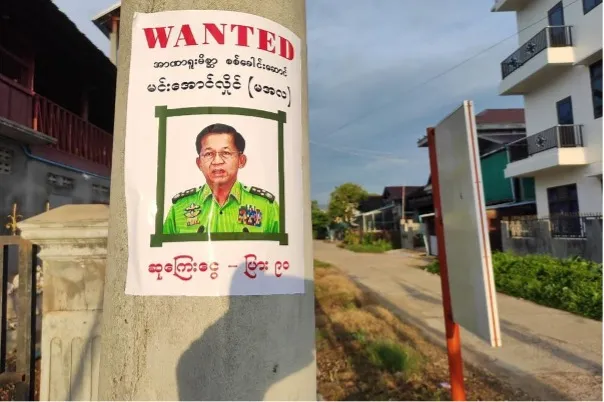Table of Contents
24th October 2021
Myanmar’s military regime may soon find it more difficult to access its financial assets in Singapore, following discussions between authorities there and US officials on how to partner effectively to wield the city state’s financial leverage over the junta.
Derek Chollet, counsellor of the US Department of State, who was in Southeast Asia this week to work with regional countries to help restore democracy in Myanmar, had a meeting with the Monetary Authority of Singapore on Wednesday to discuss ways to limit the Myanmar military regime’s access to overseas financial assets. The counsellor tweeted that the meeting was productive.
Singapore is the largest foreign investor in Myanmar and has become a preferred destination for Myanmar’s military rulers and their associates, who make periodic visits for medical trips, recreation or to squirrel their money away in various accounts under different names. Furthermore, some companies there have commercial ties with the Myanmar military junta and its conglomerates.
The US and other Western democracies have pressured the regime by singling out certain key individuals as well as entities to make it harder for them to transact business in the international community, forcing the regime to struggle with a hard currency shortage.
As a result, some Singaporean companies have become a lifeline for the junta by channelling money to it.
In February, for example, Justice For Myanmar reported that Singapore Stock Exchange (SGX)-listed Emerging Towns & Cities Singapore (ETC) made payments worth millions of dollars to the regime as the developer of the Golden City complex in Yangon. The land is owned by the military and ETC has a build-operate-transfer agreement with the Myanmar Army’s Quartermaster General’s Office.
According to ETC’s 2017 annual report, the Golden City deal with the military involves a “land use premium” payment of US$6.3 million, plus annual payments of $2.8 million, with exemptions on lease payments from 2013-16.
The total in payments to the military over the maximum 70-year term amounts to US$191.1 million.
As of Dec. 31, 2019, ETC had accrued US$32.185 million for land lease payments to the Myanmar army, the report says.
On Wednesday, Justice For Myanmar said a legal memorandum has found that international law and guidance places due diligence obligations on the SGX, and possible liability on the Monetary Authority of Singapore and the Singapore government, in relation to companies like ETC doing business with the Myanmar military.
The legal memo also raised the possibility of reputational and sanctions risks for the SGX, its regulator the Monetary Authority of Singapore, and by extension, the Singapore government, should it not prevent continued payments from ETC to the Myanmar army.
On Thursday, Chollet didn’t provide details when asked about the outcomes of his meeting with the Monetary Authority of Singapore on how to limit the junta’s access to overseas assets.
But he said, “Singapore has a very, very important role to play”, adding that they had very good discussions there on how to wield whatever leverage they could over the regime.
Source The Irrawaddy 22nd October 2021.
In other words, the US has exercised leverage over Singapore and will use that to gain some leverage over ASEAN as well. The financial war is heating up.
Meanwhile, the real war continues as the clip below attests. It is a clip of a drive-by attack by a PDF in Yangon on a military checkpoint. It was reported that there was one Tatmadaw fatality and one injury.
These checkpoints are dotted throughout Yangon and previously were used by the police as traffic checkpoints. They have now been taken over by the military, and are used for, among other things, the monitoring of movements throughout Yangon. Although it is a very minor attack there are now enough of them happening for them to be an irritant, and by picking off one soldier here and another there it is having an impact on the morale of the troops. What was once a cosy, safe posting in Yangon has now become dangerous for the average soldier.
On the diplomatic front, the Quad nations have been discussing the situation in Myanmar and it does have implications for New Zealand. As the Quad strengthens opposition to China within the South and South East Asia region New Zealand will find itself walking an even more precarious tightrope in its relations with China and the Western world. Whilst the traditional allies of New Zealand will tolerate and understand a certain amount of freeloading and piggybacking on defence issues, they are slowly restricting New Zealand’s access to information and decision making.
Last month, the first in-person summit of the Quadrilateral Security Dialogue (QUAD), a four-country group comprising the US, Japan, India and Australia, called for an end to violence in Myanmar, which has come close to slipping into civil war. The four-nation alliance, which China has dubbed an Asian NATO, is expected to play a more active role in the Asia-Pacific region in the months and years ahead. During the first QUAD summit, held virtually in March, it became clear that the four-nation alliance has an inclusive agenda. It decided to launch an ambitious COVID-19 vaccine supply program and formed working groups to explore cooperation in the realms of emerging technologies and climate change. The leaders also made it clear that finding an early solution to the Myanmar crisis was a top priority.
Dr. Pathak, who is an associate professor and director of the Centre for Northeast Asian Studies at India’s O.P. Jindal Global University’s School of International Affairs commented “As responsible players of the international system, the members of the QUAD need to engage and find a peaceful solution to the crisis, lest China foments further crises as it has done in the past in several other regions and countries. While the aim should be restoring peace and tranquillity, what cannot be forgotten is that China can and will use the slightest opportunity, even if it is at the cost of regional and global peace, to fulfil its narrow, selfish national interests which rely primarily on reducing stability and security for other actors of the international system,”
Source The Irrawaddy 25th October 2021.
The implications are stark. The non-participation of New Zealand in the Quad will give the Chinese leverage to weaken the allied relationships in the South Pacific.
Please share this article so that others can discover The BFD









